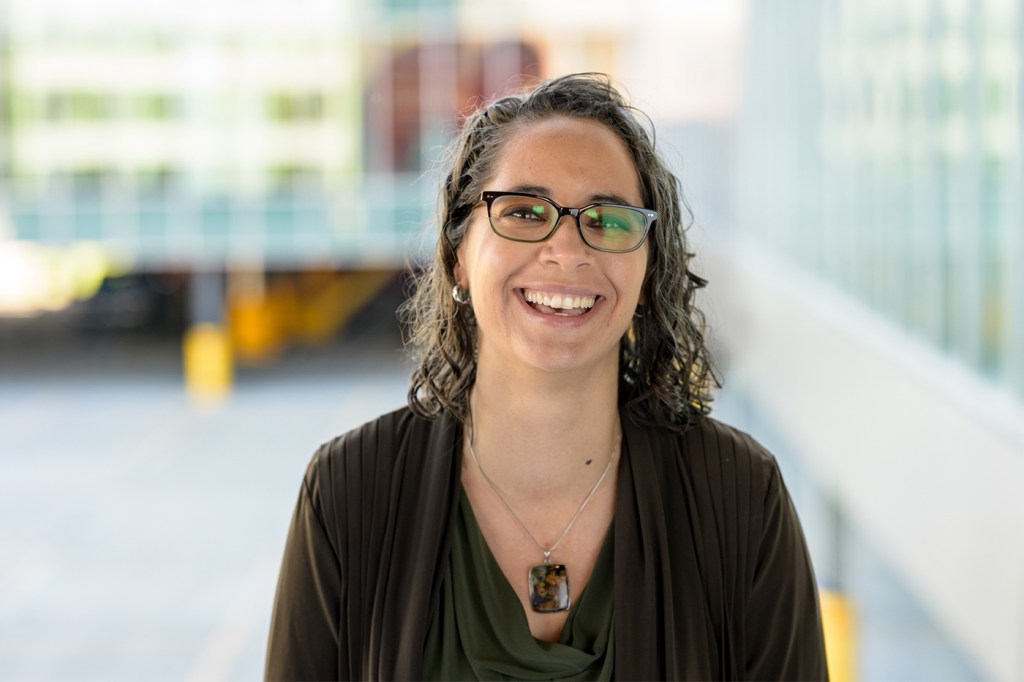Alicia Jalbert is inspiring high schoolers in Maine to pursue science careers
Jalbert was honored with a John T. Gorman Fellowship, which focuses on improving the lives of people in Maine, particularly those experiencing poverty.

Alicia Jalbert couldn’t be busier in her role as associate director of community partnerships at Northeastern University’s Roux Institute in Portland, Maine.
“It’s really challenging and rewarding,” Jalbert says.
One of the projects she’s leading involves Jobs for Maine Graduates (JMG), a leading educational nonprofit specializing in workforce development and student success in Maine. Together they’re developing an AI and data-science career exploration module for high school students to be piloted this spring and fully launched next fall.
Rolling out AI and data project
“Students across the country are struggling with math, especially after the [COVID-19] pandemic, and Maine is no exception,” Jalbert explains. “For the Roux to meet its mission as an economic opportunity engine for Maine, we can’t forget about ‘top’ of the talent funnel — youth need to have foundational math skills to succeed in tomorrow’s STEM careers.
“So we’re capitalizing on the excitement around data science and AI to get kids excited about math. We’re adding an AI and data science twist to fundamental math skills in these modules to boost teacher and youth engagement and participation.”
STEM from the K-12 perspective
In her previous job, Jalbert was the computer science coordinator for the public school district in Lewiston, Maine. Then she heard about the Roux Institute’s mission to elevate Maine in the tech, data and life sciences fields.
“I saw it as a [vehicle] for all of the advocacy work I’d been doing around computer science and STEM education from the K-12 perspective,” Jalbert says of her interest in working at the institute. “Joining the Roux has allowed me to do that at a much bigger scale across the state and work with really cool partners to make it happen.”
Honored with Gorman Fellowship
Jalbert recently was honored with a John T. Gorman Fellowship, which focuses on improving the lives of people in Maine, particularly those experiencing poverty. “The best way to do that is with comprehensive approaches that strengthen the whole family,” the foundation reports, citing research as well as its own program outcomes.
Jalbert is using the prestigious fellowship to explore cutting-edge tools — such as AI, 3D printing and additive manufacturing — that the Roux Institute and Northeastern can utilize to educate and inspire children in Maine.
“How can we support Maine kids with critical thinking skills?” Jalbert says. “What can the Roux and Northeastern bring to this cohort — and how does that complement the work that the other fellows are doing?”
Benefits of augmented reality
Jalbert is also developing a project in conjunction with Michael Wilczek, a Roux Institute assistant teaching professor, that uses augmented reality to make science more attractive for high school students.
“We’ve developed 3D models around things like plant and animal cells and DNA replication,” Jalbert says. “We’ve been traveling to high schools throughout the state, trying it out and making sure it complements what kids are learning in their high school biology and chemistry classes.”
Establishing partnerships
Jalbert loves the potential of her grassroots efforts in Maine.
“Every partner and school that I get to connect with I look at as a puzzle,” Jalbert says. “They have a particular need or they want to get to a certain spot — and Northeastern has such a plethora of resources and subject-matter expertise. Where can we find the match to help amplify the work that community partners are already doing?
“The K-12 work is one pillar. I also work with nonprofits, local municipalities and mission-driven organizations. And one thing that’s been exciting is hearing about the data that these organizations want to collect — or that they have collected but they don’t know how to use it in ways to grow their mission. We have hundreds of data-science, data-analytics and project-management students who want to get engaged with the Maine community. Finding those matches has been rewarding.”
